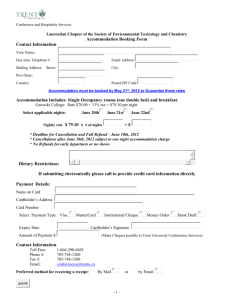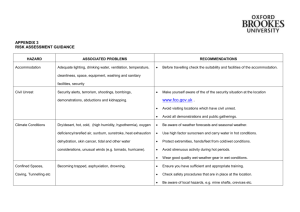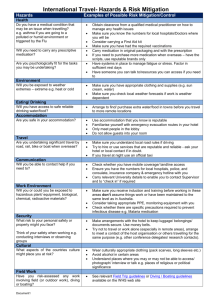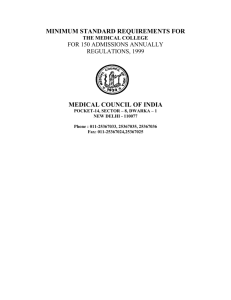Risk Assessment – Residential Visits
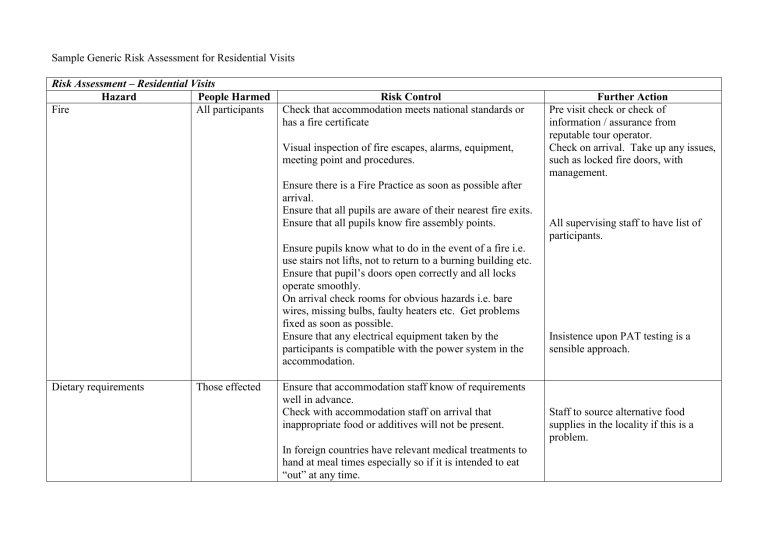
Sample Generic Risk Assessment for Residential Visits
Risk Assessment – Residential Visits
Fire
Hazard People Harmed Risk Control
All participants Check that accommodation meets national standards or has a fire certificate
Visual inspection of fire escapes, alarms, equipment, meeting point and procedures.
Ensure there is a Fire Practice as soon as possible after arrival.
Dietary requirements
Ensure that all pupils are aware of their nearest fire exits.
Ensure that all pupils know fire assembly points.
Ensure pupils know what to do in the event of a fire i.e. use stairs not lifts, not to return to a burning building etc.
Ensure that pupil’s doors open correctly and all locks operate smoothly.
On arrival check rooms for obvious hazards i.e. bare wires, missing bulbs, faulty heaters etc. Get problems fixed as soon as possible.
Ensure that any electrical equipment taken by the participants is compatible with the power system in the accommodation.
Those effected Ensure that accommodation staff know of requirements well in advance.
Check with accommodation staff on arrival that inappropriate food or additives will not be present.
In foreign countries have relevant medical treatments to hand at meal times especially so if it is intended to eat
“out” at any time.
Further Action
Pre visit check or check of information / assurance from reputable tour operator.
Check on arrival. Take up any issues, such as locked fire doors, with management.
All supervising staff to have list of participants.
Insistence upon PAT testing is a sensible approach.
Staff to source alternative food supplies in the locality if this is a problem.
Hazard
Child protection
Hazards in rooms
Hazards in hotel / on site
People Harmed Risk Control
All participants Ensure immediate accommodation is exclusive to your group.
Ensure wherever possible that access to the group’s accommodation is restricted. This can be via either reception staff or some other method.
Ensure that linking balconies are secured and locked from the inside.
If young people’s rooms have keys the staff have access to a master key.
Young people can easily contact staff throughout the night.
Young people are checked into rooms at “lights out”
All participants Check rooms immediately on arrival.
Check security of balcony doors, ensure they both shut and lock.
Check that balconies have guard-rails and are safe to stand on.
Check temperature of hot water systems.
Check on any boiler systems in rooms looking especially for sooting around vents and pilot light holes.
Check all electrical equipment and plug sockets.
Check security of bunk beds and their proximity to light fittings or other hazards.
Check for openings into roof space, especially where bunk beds are being used.
All participants Ensure that lifts have internal doors fitted.
Place out of bounds any areas considered dangerous i.e. balconies, rooftops etc.
Place out of bounds any entrances that open directly onto main roads unless accompanied by staff.
Insist on the wearing of indoor footwear where it is
Further Action
Gain floor plan on pre-visit.
Pre visit check or check of information / assurance from reputable tour operator.
If not safe insist that the balcony doors be secured.
Pre visit to check this out.
Hazard
Young person gets lost
Local traffic (foreign)
People Harmed Risk Control expected that slippy floors may result from becoming wet etc.
All participants Issue all participants with details of the hotel(s) used and contact numbers in both English and the language(s) of the country or countries to be visited.
If off-site the details of an emergency contact and location to be provided as above.
Party organisation and regular head counts to reduce the danger.
All participants Remind participants that traffic will appear on the other side of the road.
Italy (south & central) traffic does not obey pedestrian crossing signals.
France (parts) traffic in road islands has to give way to those entering not the other way round as in Britain
Young Persons Collect passports from young people as soon as possible.
Store them in the hotel / site safe until needed.
Further Action
Passports (foreign)
Medical treatment (foreign) All participants Collect medical permission forms from all participants prior to departure.
Have someone who can speak the language amongst the party.
Participants to have completed E111 forms as appropriate.
Ensure sufficient funds are available for medical treatment in the country to be visited.
Organise such additional medical insurance as may be necessary in the country to be visited.
Supervising staff to organise a collective passport for younger children where the risk is greater.
If this is not possible ensure that the
“company”/provider will be able to supply such a competent person.
New E111s each year are required.
Photocopies made and kept by the supervisors.
Hygiene
Hazard
Special needs
People Harmed
All
All
Risk Control
Provision of individual personal sterile equipment where local conditions apply.
Tourist board rating, /environmental health endorsement or similar.
Visual inspection of washing facilities, lighting, heating, ventilation, catering.
Accommodation meets any special needs of anyone in the group.
Night time tendencies Young People
This Risk assessment seen and agreed by:
Name
Information gained from parents re pupil’s illnesses, sleepwalking etc.
Suitable supervision arranged to meet needs of pupils.
Signature Date
Further Action
Pre visit check and/or check of information/assurance from reputable tour operator).
Pre visit check as necessary.
Use of parental consent form

